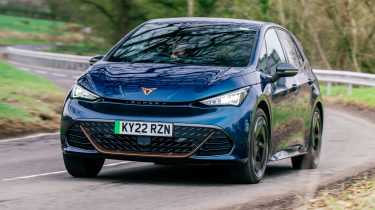Company car tax for electric cars explained 2025
EVs are now more expensive for company car drivers, but they’re still much cheaper than petrol or diesel alternatives

There are many reasons to pick an electric car in 2025, but the arguments are even stronger for company car drivers. Thanks to government incentives, electric cars are nearly always cheaper than their petrol, diesel and hybrid counterparts when leased through a company car scheme.
It all comes down to how benefit-in-kind (BiK) tax is calculated. Company cars aren’t free – drivers must pay an annual tax bill based on their income tax band, the value of the car and its CO2 emissions. We’ll explain how it works a bit further down, but our complete guide to company car tax will walk you through the ins and outs of the benefit-in-kind system.
Electric cars don’t emit any CO2 so they naturally fall into the lowest BiK tax band. That said, BiK rates changed in April 2025, making electric cars marginally more expensive for company car drivers. Rates are set to increase year-on-year until 2028, although EVs will still be comfortably cheaper than petrol, diesel and hybrid cars.
As a company car driver, you won’t have to worry about paying vehicle excise duty (VED), otherwise known as road tax. But if you’re a private buyer considering an electric car, be aware that EVs are no longer exempt from this tax. They now incur the standard annual rate and are liable to the expensive car supplement (luxury car tax) if they cost over £40,000.
What is BiK tax and how does it work for an electric company car?
Benefit-in-kind tax is a form of taxation that's applied to any company car offered by an employer as a benefit. Company car tax is payable by both the employer and employee. The amount is calculated depending on the car’s ‘P11D' value (HMRC’s valuation of the car, including VAT and delivery fees), CO2 emissions and income tax bracket of the employee.
Every car is assigned a ‘BiK rate’ based on its CO2 emissions, with more polluting models receiving a higher rate. The system is set up in this way to encourage company car drivers to pick a more eco-friendly car. The BiK tax bill is calculated the same way for petrol, diesel, hybrid and electric cars, using the following formula:
P11D value (£s) x BiK rate (%) x Income tax band (%) = Annual tax payable
The important difference lies in the CO2 emissions of an electric car – or lack thereof. Electric cars don’t emit any CO2, meaning they receive the lowest BiK rate. Up until April 2025, this was fixed at 2%. It has since risen to 3% and will continue to rise by 1% year-on-year until 2028. For comparison, the most efficient petrol car falls into the 16% BiK bracket.
Is an electric car always cheaper for company car drivers?
We can’t say that an electric car will always be cheaper for company car drivers, but it will be the more affordable option in most scenarios.

Let’s look at an example. Our Best Company Car award winner, the Cupra Born, has a P11D value of £35,440. Like all electric cars, it’s taxed at the 3% BiK rate, resulting in a BiK value of £1,063.20.
This is then taxed at your income tax rate, resulting in an annual bill of £212.64 for 20% taxpayers, £425.28 for 40% taxpayers or £478.44 for 45% taxpayers.
Now let’s take an equivalent petrol car with a similar P11D value. The Volkswagen Golf in R Line trim has a P11D value of £30,855. Its 1.5-litre petrol engine emits 124g/km of CO2, placing it in the 30% BiK rate bracket. The taxable BiK value for this model equates to £9,256.50 – almost nine times more than the electric Cupra.

Your tax bill would be £1,851.30 for 20% taxpayers, £3,702.60 for 40% taxpayers or £4,165.43 for 45% taxpayers. This is significantly more expensive than the electric alternative, despite the Golf having a cheaper list price.
I don’t want an electric car – what company car should I choose instead?
An electric car won’t be for everyone for various reasons. If you’re looking for an alternative company car, a plug-in hybrid is likely to be your next best bet. The BiK rate for plug-in hybrids is not only dependent on their CO2 emissions, but also their electric-only driving range.
The further a plug-in hybrid can drive under electric power alone, the lower the BiK rate. For example, a Volkswagen Tiguan eHybrid that can travel 77 miles on electric power will be taxed at 6%, whereas the 38-mile Hyundai Tucson will be taxed at 13%.

Of course, that will work out to be more expensive than a comparable electric SUV, but it represents a much more affordable rate compared to a petrol SUV. If you don’t want a plug-in hybrid – perhaps because you don’t have access to home or office charging – then a self-charging hybrid will probably offer the next lower BiK rate.
How much does the company pay in tax?
The company must also pay tax based on a combination of the car’s P11D value and how much CO2 the car emits. For this reason, it’s also often cheaper for the employer to provide their employee with an electric car versus a petrol, diesel or hybrid car.
Is tax for an electric company van calculated the same way?
Electric vans fall under a different taxation system known as the ‘van benefit charge’. A conventionally powered van costs a flat rate of £4,020 to tax under this system but as of the 2025/2026 financial year, fully electric vans remain tax exempt.
Read our list of the best company cars and best small company cars…
Recommended

New Subaru Trailseeker revealed as rugged electric SUV with 375bhp

New Subaru Solterra brings more range, power and polish
Most Popular

Omoda E5 targets rivals: now with zero deposit and APR
Tips & advice

Car dashboard warning lights: what does each symbol mean?

Electric car charging stations: public networks, charger types, apps and maps










